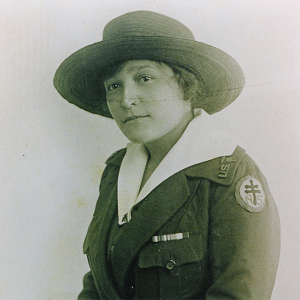By Terrie Todd
Do you know about the remarkable Charlotte Edith Anderson Monture? How about just Edith Monture?
On April 10, 1890, Edith was born to Mohawk parents on Six Nations reserve near Brantford, Ontario, Canada. The youngest of eight children and considered a gifted student, Edith broke boundaries for females—Indigenous or otherwise—by graduating from high school. She then began applying to Ontario nursing schools, only to discover most Canadian nursing programs excluded Indigenous women. The determined young woman began applying to schools in the United States. The New Rochelle Nursing School in New York accepted her and she graduated in 1914, first in her class. Boy, I bet those other schools regretted rejecting her.
At the age of 27, Edith and 14 other Canadians volunteered with the U.S. Army Nurse Corps. One of the few Indigenous women to serve overseas with this Corps during WWI, Edith returned to her reserve before leaving for France. With many dying in the war, her community didn’t expect her to return. They gifted her with ceremonial Mohawk burial wear.
 |
| Edith Monture |
Edith worked as a nurse in Vittel, France, treating soldiers injured in gas attacks and trench warfare. At times, she walked across battlegrounds looking for wounded. One of her diary entries describes a 14-hour shift during which a 20-year-old patient to whom she’d grown attached as a big sister, died.
“My heart was broken. Cried most of the day and could not sleep.”
Edith returned to her reserve after the war and married Claybran Monture. They had four children and a fifth who died in infancy. Edith became an advocate for better Indigenous health care, working as a nurse and midwife on the reserve until she turned 65.
Although Indigenous women as a whole could not legally vote in federal elections until 1960, the Military Service Act of 1917 gave Edith voting rights because of her status as a wartime nurse. She became the first female Status Indian and registered band member to gain the right to vote.
Edith’s local newspaper, The Grand River Sachem, interviewed her at age 93. Her mind proved crystal clear as she described her war memories. “We would walk right over where there had been fighting. It was an awful sight — buildings in rubble, trees burnt, spent shells all over the place, whole towns blown up.”
Edith died a week before her 106th birthday and is buried in St. John’s Anglican Cemetery on the Six Nations reserve. Shortly before she passed, her granddaughter, Terri L. Monture, transcribed Edith’s diary from her year in France into digital form for the sake of her 14 grandchildren, numerous great-grandchildren, and other young Indigenous people. In her introductory remarks, Terri wrote of her grandmother, “That the events of one year should be the defining experience of her long, long life is telling in how incredibly significant it really was, and how powerful the memory of that hellish year.”
Edith’s grandson, John Moses, said, “It’s a tremendous source of pride because I know that for many years she was seen as a role model by a number of other nurses.” His mother, Edith’s daughter Helen, also became a nurse and one of the founding members of the Canadian Indigenous Nurses Association. Today, Brantford has a street, a park, and a school named for Edith Monture.
Sources:
100 Canadian Heroines: Famous and Forgotten Faces, by Merna Forster, Dundurn Press, 2004
https://www.thecanadianencyclopedia.ca
https://www.womenshistory.org
When Rusty Thorne joins the Canadian Army, he never imagines becoming a Japanese prisoner of war. Only his rare letters from home sustain him—especially the brilliant notes from his mother’s charming helper, which the girl signs simply as “Rose.”
Rose Among Thornes received the 2022 Debra Fieguth Social Justice Award as well as Best Cover Award from The Word Guild.
Follow Terrie here:
Blog
Quarterly Newsletter Sign-up



Thank you for posting today! I love hearing these stories.
ReplyDelete